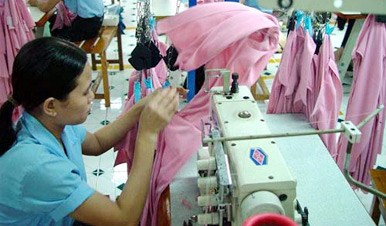Business need to safeguard themselves
 |
The country has been faced with 50 anti-dumping and four anti-subsidy lawsuits since the first one filed by Columbia in 1994, according to the Vietnam Chamber of Commerce and Industry (VCCI).
Many global economies have recently used commercial safeguards as a new technical barrier to their protect domestic production.
As a result, many Vietnamese economic sectors are struggling against high anti-dumping and anti-subsidy tariffs on commodities imposed by importing countries.
In its latest administrative review, the US Department of Commerce decided to levy new, much higher margins on frozen Vietnamese fish fillets imported into the US.
Nguyen Duy Khien, Head of the American Market Department under the Ministry of Industry and Trade, points to the fact that the number of lawsuits will increase as the economy continues to encounter difficulties.
Countries that maintain large trade exchanges with the US usually face more lawsuits, and Vietnam is no exception. It has so far dealt with seven anti-dumping lawsuits instigated by the US.
An increase in bilateral trade with Brazil means Vietnam is encountering even more lawsuits. Among the goods Brazil imported from Vietnam in 2012, footwear accounted for 36 per cent, machinery 16 per cent, seafood 10 per cent, household utensils 7 per cent, rubber 6 per cent, and garments and textiles 3 per cent.
In 2011 alone Brazil sued Vietnam for dumping its textiles on its market, and the number of legal proceedings, focusing on imports of stainless steel, automobile and bike tyres, increased to three in 2012.
Domestic production under pressure
Meanwhile, several domestically-manufactured products have come under great competitive pressure from similar imports.
Steel is a case in point. Vietnam imported nearly 1.5 million tonnes of steel from China between January-November 2011. The figure rose to 2.148 million tonnes a year later, with hot rolled coils skyrocketing 170 per cent, hot rolled sheets 199 per cent, and rolled wire 557 per cent.
Building glass and vegetable oil are also in the same fix. Large amounts of imported vegetable oil put domestic production at a disadvantage. Statistics show that Vietnam purchased 291,230 tonnes of vegetable oil in 2011, and which doubled in the following year. In late 2012, domestic vegetable oil producers lodged an appeal to the Vietnam Competition Authority, proposing that it implement commercial safeguards for their product.
Experts suggest that businesses only apply safeguard measures if imports affect domestic production. Vietnam has issued a number of legal documents, including the 2004 National Assembly anti-dumping and anti-subsidy ordinances, enabling businesses to sue foreign exporters if their exports damage domestic production.
Solutions
The Ministry of Industry and Trade has warned businesses to thoroughly research the US federal and state legal systems before they sign trade contracts. Price competition usually results in anti-dumping lawsuits.
To this end, Vietnamese businesses are advised to improve their production capacity by cutting costs, material inputs, and fuel consumption, in addition to increasing labour productivity. Comprehensive production records should also be kept in case a lawsuit is filed.
Businesses are also encouraged to familiarise themselves with their counterparts before signing any wholesale contracts.
Experts say, in order to take advantage of the opening up through Vietnam’s global integration, domestic businesses need to carefully study the markets and follow developments closely. They also need to strengthen links with other businesses, craft associations and authorised agencies to deal with problems that may arise.
What the stars mean:
★ Poor ★ ★ Promising ★★★ Good ★★★★ Very good ★★★★★ Exceptional
Related Contents
Latest News
More News
- Hermes joins Long Thanh cargo terminal development (February 04, 2026 | 15:59)
- SCG enhances production and distribution in Vietnam (February 04, 2026 | 08:00)
- UNIVACCO strengthens Asia expansion with Vietnam facility (February 03, 2026 | 08:00)
- Cai Mep Ha Port project wins approval with $1.95bn investment (February 02, 2026 | 16:17)
- Repositioning Vietnam in Asia’s manufacturing race (February 02, 2026 | 16:00)
- Manufacturing growth remains solid in early 2026 (February 02, 2026 | 15:28)
- Navigating venture capital trends across the continent (February 02, 2026 | 14:00)
- Motivations to achieve high growth (February 02, 2026 | 11:00)
- Capacity and regulations among British areas of expertise in IFCs (February 02, 2026 | 09:09)
- Transition underway in German investment across Vietnam (February 02, 2026 | 08:00)

 Tag:
Tag:

















 Mobile Version
Mobile Version